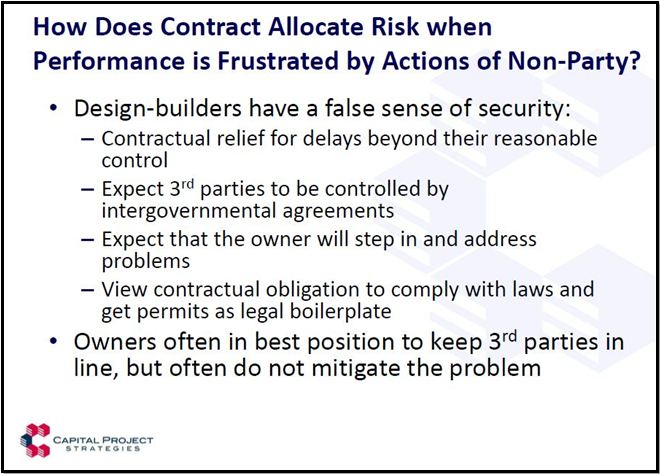By Steve Rizer
One of the lessons that can be learned from recent design-build case law is that design-builders are being held responsible for problems caused by third parties, Capital Project Strategies LLC President Michael Loulakis said late last year during a WPL Publishing webinar, a recording of which recently was added to the ConstructionPro Network (ConstructionProNet.com) Download Library -- free of charge for members.
In discussing this point, Loulakis told a target audience of owners, consultants, engineers, architects, subcontractors, and construction law attorneys, “The question is ‘How strong is that responsibility that design-builders are being held for dealing with problems caused by third parties?’ And the more specific question … is ‘How does the contract allocate risk when performance is frustrated by the actions of a non-party?’ [see figure below].”

“In my own experience, I think that design-builders, and contractors as well, have a false sense of security in believing that they are going to get contractual relief for delays beyond their reasonable control, inclusive of third-party delays,” Loulakis said. “[There is an issue regarding] governments that don’t perform fast enough in terms of inspections or in terms of approvals, and what we know is that on a lot of projects, on every project, we’ve got some form of governmental approval.”
Such approval may involve a fire marshal inspector “or something that is fairly simplistic, but on design-build projects, particularly the really big ones, we have third-party governmental agencies that play an incredibly important role in figuring out not only what the ultimate design might look like but also whether or not we’re going to have a functioning project.”
During the webinar, Loulakis listed the following other lessons learned in design-build case law:
- Design-builders may be seeing an erosion of the Spearin and Good Faith and Fair Dealing doctrines.
- Contractors take great risk in failing to follow the requirements of the Changes Clause.
- Cost-plus contracts are not “no risk” contracts.
- When a request for proposal says, “No exceptions allowed,” it means, “No exceptions allowed.”
- Agencies are given deference in making their procurement decisions.
- Pay attention to the conditions precedent to arbitration/litigation.
- Designers can be targets when things go wrong.
For immediate access to the complete webinar (full audio and visual) -- as well as two dozen other construction-related webinars that are available for download -- sign up to become a member of WPL Publishing’s ConstructionPro Network, a complete training, education, and development resource for the construction industry, at http://constructionpronet.com/info/Charter2012.aspx.

